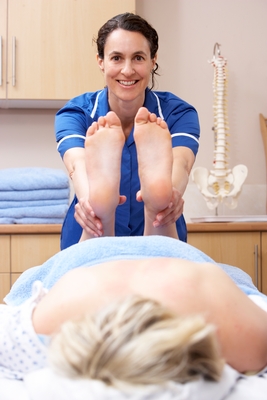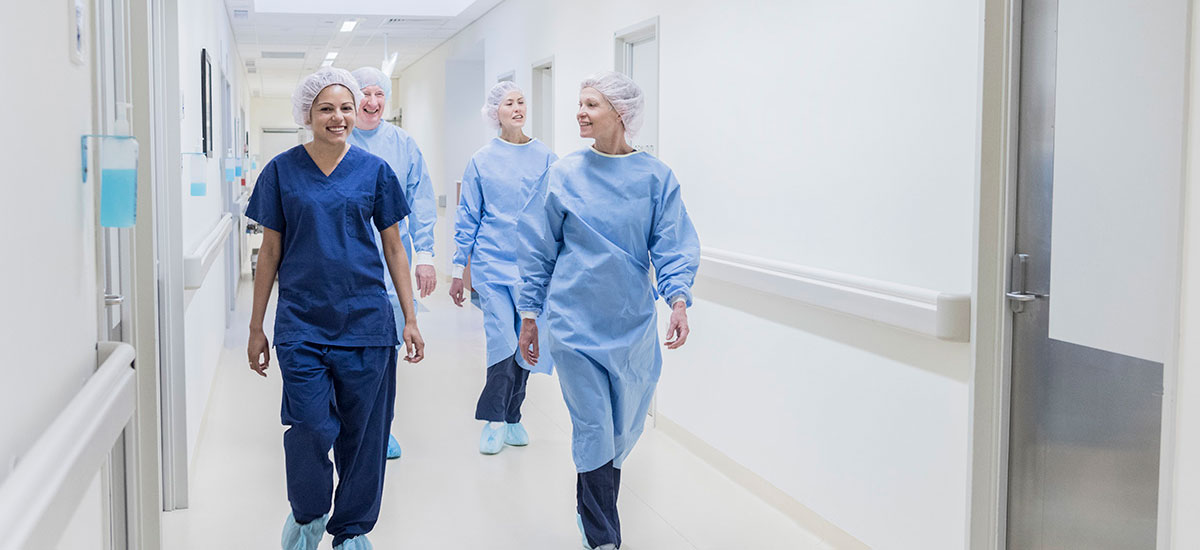Orthopedic Surgery at Specialty Surgical Center
Orthopedic care means correcting problems of the musculoskeletal system. This means that if you have a problem with your bones, muscles, or anything else that holds your skeleton together, you should see a physician who specializes in orthopedics. The bulk of our patients come from people who need orthopedic surgery at our facility. To keep up with the high demand, we have seven orthopedic partners who are board certified in the orthopedic surgery specialty. Many of them are New Jersey natives!
Our specialists perform orthopedic surgeries to correct problems ranging from sports injuries to diseases that break down the musculoskeletal system. Even though our surgeons are experienced at numerous orthopedic surgeries, the most common ones we see at Specialty Surgical Center are arthroscopy of the knee and shoulder; back and spine surgery; hip replacement; and joint replacement surgery.
Arthroscopy is the most common procedure – about 3,000 arthroscopy knee surgeries are performed per year! During an arthroscopy, our surgeons use tiny cameras that provide the ability to see the knee or shoulder joint on a screen. With a better view, the surgeon can manipulate the damaged tissue by either repairing it or removing it, which will depend on the underlying cause of the knee or shoulder pain.
Our back and spine surgeries, like all of our procedures, are outpatient – so the patient can go home that same day. The advantage of having a procedure at an ambulatory surgical center is that patients can be relieved of back pain for less money than a traditional hospital with less recovery time. A few procedures that fall into this category include disc decompression, mending herniated discs, and treating overgrown bones to name a few.
Hip replacement surgery is needed when a patient’s hip joint is diseased and needs to be removed. An artificial part (prosthesis) is inserted where the old hip joint was. This surgery is beneficial to treat patients with arthritis, injuries, or pain. Joint replacement surgery follows the same process as hip replacement surgery. Both procedures remove damaged joints and place a prosthetic. Joint replacement surgery can be performed on any joint (area between two bones), but it is most commonly done on the hips, knees, and shoulders.
All of our orthopedic partners are experts in these procedures and more! If you need surgery for an orthopedic condition not listed, please do not hesitate to call our office. More than likely, we will have an orthopedic surgeon on staff that can professionally treat your musculoskeletal condition.
For more information about Specialty Surgical Center, call 973-940-3166 or visit our Contact Page.
When is Tendon Repair Surgery Necessary?
The first step to determining whether tendon repair surgery is needed from Specialty Surgical Center’s hand surgery partners is locating the source of the damage. In the hand, there are two classes of tendons called extensor tendons and flexor tendons. Extensor tendons allow you to stretch out your fingers and thumbs to make them straight. Flexor tendons do the opposite and are responsible for allowing you to curl your fingers and thumb so you can grab. Both stem from the forearm and connect your hand muscles to your bone.
Tendon damage due to rheumatoid arthritis, sports injury, or being crushed may result in pain and limited range of motion in the fingers. However, surgery is not always the answer to treating tendon damage. If a physician determines that the tendon is only partially torn, the patient may only need to wear a splint and receive physical therapy treatment.
In most cases, surgery is required to repair tendons in the hand. When a tendon is ripped from the bone or the muscle, it usually cannot repair itself because the ends have ripped so far apart. After an injury, surgery should be sought right away in order to gain back as much range of motion as possible. Even though flexor tendon surgery is more complex and complicated than extensor surgery, both procedures are outpatient and should be a relatively quick surgery.
Whether the patient requires tendon repair surgery or not, our team highly recommends rehabilitation during the healing process. Your surgeon will be able to give you a more exact time frame, but patients may need to wear a splint post-operatively for a few weeks. After surgery or a partial tear, the damaged tendon could attach to other tissues in the hand and limit the range of motion of the fingers. Your surgeon may either teach you some exercises to increase your range of motion, or refer you to a physical therapist that can work with you more extensively. The amount of time needed to recover from a tendon injury depends on how many hours the patient spends doing rehabilitation exercises and wearing the splint.
Specialty Surgical Center is located in Sparta, New Jersey and our staff consists of board certified surgeons and anesthesiologists performing procedures in Orthopedics, Sports Medicine, Spinal Care, Podiatry, Urology, Pain Management, ENT, Hand Surgery, Lithotripsy, Brachytherapy, GYN and Laser Surgery.
For more information about Specialty Surgical Center, call 973-940-3166 or visit our Contact Page.
Facet Joint Block for Pain Management
A facet joint block is a diagnostic and pain relieving injection that helps ease chronic back pain. Pain management specialists at Specialty Surgical Center may administer this injection to provide short-term pain relief and determine where in the spine a patient’s pain is coming from. Some patients may require multiple facet joint blocks over the course of several months for sustained pain relief. However, if the facet joint block injection is used for diagnostic purposes, the surgeon may recommend an alternative treatment once the source of the patient’s pain is located.
Facet joints are located in the spine between vertebrae. They help you move your spine easily and fluidly, but are also responsible for keeping the spine stable. As we get older, our facet joints begin to wear down, making them susceptible to degenerative and arthritic conditions that cause pain in lumbar (lower back), thoracic (upper back), and cervical (neck) back. A facet joint block injection is beneficial because the medication is injected directly into the affected area(s), providing much quicker pain relief than taking pain medications orally.
The Procedure
Your physician may have you change into a hospital gown to provide him or her easy access to your back. Then, the area is cleaned and sanitized to reduce the risk of infection. A physician will then inject a local anesthetic into the tissue around the affected facet joints to minimize discomfort during the procedure.
The physician may use a tool called a fluoroscope (X-ray imaging device) to ensure needle placement accuracy. Additional dyes that show up on the fluoroscope may be injected into the facet joint so the physician can confirm the needle is in the right place. Finally, an anesthetic and steroid solution will be injected through the needle to reduce inflammation and pain.
Side effects are minimal and usually only last a few days. Nevertheless, side effects from a facet joint block may include: tenderness around the injection site, fluid retention, increased blood pressure, or headaches. These side effects are typically rare, but your Specialty Surgical Center pain management specialist can review them with you and discuss whether you should continue taking your current pain medication or not.
For more information about facet joint blocks, talk to your pain management specialist today!
Specialty Surgical Center is located in Sparta, New Jersey and our staff consists of board certified surgeons and anesthesiologists performing procedures in Orthopedics, Sports Medicine, Spinal Care, Podiatry, Urology, Pain Management, ENT, Hand Surgery, Lithotripsy, Brachytherapy, GYN and Laser Surgery.
For more information about Specialty Surgical Center, call 973-940-3166 or visit our Contact Page.
Guide to Hip Replacement Surgery and After Care
Specialty Surgical Center offers hip replacement surgery as an outpatient procedure. Our board certified orthopedic surgeons recommend hip replacement surgery to patients who are in significant pain and cannot do daily tasks like they were previously able to due to their damaged hip joint. This pain is often caused by rheumatoid arthritis, but can also be a result of osteonecrosis or injury. Surgery is often recommended when pain medication and physical therapy has not sufficiently treated a patient’s pain.
The Procedure
The goal of hip replacement surgery is to remove the damaged hip joint and replace it with an artificial joint called prosthesis. The first step of hip replacement surgery actually occurs before the day of the surgery. The surgeon will walk you through the procedure and answer all of your questions. It may be useful to bring something to write on so you can bring the pre-operative instructions home with you. Tell the surgeon about all of your medications and vitamins you take. Depending on what the medicine is for, you may be asked to stop taking it a few days before surgery. You may be asked to stop eating food and avoid all drinks except water night before the procedure.
On the day of your surgery, you may be asked to change into a surgical gown. The hip is cleaned to avoid injection and you are given an anesthetic. The surgeon might only need to make one or two incisions since hip replacement surgery at Specialty Surgical Center is minimally invasive. Two incisions could be needed if the surgeon uses an anterior approach and performs the procedure from the back. Then, the surgeon will take off any muscles or tendons attached to the hip to prepare to remove the damaged hip. Once the prosthesis is put in, the surgeon will patch up any surrounding tissues that were damaged and stitch up the incision(s).
After Care
After surgery, patients will be moved to Specialty Surgical Center’s recovery room where they rest and get ready to go home later that day. You should avoid getting your hip area wet for about a week and consider getting a walking aid to help you move around the first few days after surgery. We may have aids to loan you, so be sure to ask before you go! Our physicians recommend sleeping on your back with a pillow slightly elevating your legs. While sleeping on your side is ok, we advise against sleeping on your stomach so you don’t use your hip to move your legs in your sleep. The surgeon might recommend physical therapy during the recovery process. Physical therapy can help you gain flexibility in your hips and help manage post-operative pain.
If you have any questions about the length of time you will need to get back into your normal routine, or any questions about the procedure, please call our Sparta, New Jersey location. We want to make our patients as comfortable as possible and want you to be fully informed about your procedure.
Specialty Surgical Center is located in Sparta, New Jersey and our staff consists of board certified surgeons and anesthesiologists performing procedures in Orthopedics, Sports Medicine, Spinal Care, Podiatry, Urology, Pain Management, ENT, Hand Surgery, Lithotripsy, Brachytherapy, GYN and Laser Surgery.
For more information about Specialty Surgical Center, call 973-940-3166 or visit our Contact Page.
Why Smoking Complicates Surgery
While the chances of developing a surgical complication or post-operative condition is rare, it is possible for patients to aspirate, develop an infection, or have a bad reaction to anesthesia during their surgery. At Specialty Surgical Center, we specialize in minimally invasive surgeries because they often produce less pain, a shorter hospital stay, less scarring, minimal injury to tissue, and a higher accuracy rate compared to open surgeries. Despite the many benefits of minimally invasive surgery, there is one factor we cannot control when it comes to reducing a patient’s risk of complication: smoking.
Having a smoker’s lung makes it increasingly difficult for patients to be put under anesthesia because the lungs cannot function at their maximum potential. Additionally, although cigarettes are known for their detrimental effects on the lungs, they also negatively impact blood.
Blood is a vital part of healing after surgery, so when it is hindered due to cigarette smoke, the likelihood of a post-operative complication increases. This includes having a blood clot, or worse, a heart attack following a surgical procedure. Having blood that is less healthy due to smoking also affects a surgical incision’s ability to heal.
A study in the Oxford Journals found that people who stop smoking 4-6 weeks before surgery significantly reduced their risk of infection. People who do not smoke 6-8 weeks before their surgery also lower their risk of developing lung-related complications. However, one study found patients who only abstain from smoking for 1-3 weeks prior to surgery did not lower their risk of a surgical complication at all.
Our team encourages those who smoke to quit at least 4-6 weeks before and after their procedure, if not completely. Many patients may have the mindset that they’ve smoked for a long time, so the damage is already done. In reality, the body is always healing and most patients experience tremendous health improvements after quitting. At the very least, we recommend stopping for a few weeks before your surgery to reduce your risk of complications. If over-the-counter products have not helped you quit smoking, please talk to your physician about more effective ways to quit smoking for good.
Specialty Surgical Center is located in Sparta, New Jersey and our staff consists of board certified surgeons and anesthesiologists performing procedures in Orthopedics, Sports Medicine, Spinal Care, Podiatry, Urology, Pain Management, ENT, Hand Surgery, Lithotripsy, Brachytherapy, GYN and Laser Surgery.
For more information about Specialty Surgical Center, call 973-940-3166 or visit our Contact Page.
Best Sleeping Positions After Surgery
So you’ve undergone surgery, but now you have another hurdle to jump over: the post-procedural recovery process. Your doctor at Specialty Surgical Center will explain what you can expect after surgery, but he may not cover a few comfort-related topics like what sleeping positions may be best after your procedure.
Of course, the sleeping position that’s best for you is dependent upon the type of surgery you have. Nevertheless, we’ve created a quick, comprehensive guide with some of the best sleeping positions for after surgery.
Sleeping On Your Back
One of the best sleeping positions after any kind of surgery requires lying straight on your back. Surgeries performed on the spine, hips, legs, and arms often benefit most from sleeping on the back, especially when a pillow or rolled up blanket is tucked underneath areas of the body for support, like the shoulders, low back, knees, or ankles. Specific details regarding where your legs, arms, and toes should be placed vary, but for the most part, sleeping on your back with your arms at your side and toes pointed toward the ceiling may be best. This position helps keep your body neutrally aligned, so when in doubt, you may want to sleep on your back! Regardless, be sure to call Specialty Surgical Center if you have any questions or concerns.
Sleeping On Your Side
There are instances where side sleeping may not be “okayed” by a doctor, especially for those who undergo certain spinal or hip surgeries. Nevertheless, if your doctor determines it is safe for you to sleep on your side, you may do so as long as you have a support mechanism tucked between your knees or ankles. A support “mechanism” can be as simple as one or two plush pillows or a specially designed foam block. Talk to your doctor about ways you can keep your body safe while sleeping in this position.
Sleeping On Your Stomach
In most cases, sleeping on your stomach after surgery is not advised. This position could compromise the health of your spine and put too much pressure on your hips or other areas of the body. If you’re a die-hard stomach-sleeper, we’re sorry, but you’re just going to have to stick to side sleeping or sleeping on your back until you’ve healed fully!
For more information about sleeping positions after surgery, talk to your doctor at Specialty Surgical Center! He will advise you on what sleeping positions may or may not be best after your particular surgery.
Specialty Surgical Center is located in Sparta, New Jersey, and our staff consists of board certified surgeons and anesthesiologists performing procedures in Orthopedics, Sports Medicine, Spinal Care, Podiatry, Urology, Pain Management, ENT, Hand Surgery, Lithotripsy, Brachytherapy, GYN and Laser Surgery.
For more information about Specialty Surgical Center, call 973-940-3166 or visit our Contact Page.
Should My Child See A Pediatric Gastroenterologist?

Pediatric gastroenterologists are physicians with specialized training in children’s digestive and liver disorders. They can see and administer treatment to a child from the beginning of their life as a newborn, all the way into their teenage years. If a child has a chronic digestive disorder or liver problem, such as celiac disease or Crohn’s disease, a pediatric gastroenterologist may administer long-term care to slow the progression of that child’s condition.
Determining whether or not your child needs to see a pediatric gastroenterologist can be difficult, especially since stomachaches are a common complaint among children. Most cases of a stomachache are normal and usually indicate the child has either had too much to eat, or he or she needs to use the restroom. Nevertheless, there are signs your child’s “tummy ache” is anything but an excuse to go to the bathroom.
Signs Your Child Needs To See A Pediatric Gastroenterologist
- weight loss
- Fever
- Frequent vomiting
- Severe diarrhea
- Blood in a child’s stool or vomit
- Pain on the upper or lower right areas of the abdomen
The above-mentioned symptoms sound pretty intense, but they could vary in severity level and frequency depending on the condition that’s affecting your child. Pain in the abdomen that develops gradually may suggest irritable bowel syndrome, constipation, or an allergic reaction. In these cases, dietary changes and medications are often recommended for treatment. However, if a child’s pain is sudden and severe, and located upper right or lower right part of the abdomen, you may need to take a trip to the ER (lower right = possible appendicitis; upper right = possible gallbladder disease).
The most important thing a parent can do is monitor their child’s symptoms and see a pediatric gastroenterologist right away if one or more of the above-mentioned “signs” lasts for more than a few days.
A pediatric gastroenterologist can perform diagnostic tests and various procedures for the following ailments:
- Lactose intolerance
- Celiac disease
- Crohn’s disease
- Irritable bowel syndrome
- Liver disease
- Nutritional problems
- Food allergies
- Gastroesophageal reflux disease (GERD)
- And more!
If your child requires surgery for a condition involving their digestive system or liver, please call Specialty Surgical Center today! We treat every child as if they were our own, and we work diligently to ensure your child’s procedure is as safe and as comfortable as possible. Call our location today to speak to a Specialty Surgical Center representative!
Specialty Surgical Center is located in Sparta, New Jersey, and our staff consists of board certified surgeons and anesthesiologists performing procedures in Orthopedics, Sports Medicine, Spinal Care, Podiatry, Urology, Pain Management, ENT, Hand Surgery, Lithotripsy, Brachytherapy, GYN and Laser Surgery.
For more information about Specialty Surgical Center, call 973-940-3166 or visit our Contact Page.
How Active Release Technique Helps Back Pain

Some pain management professionals may argue that patients experience the most pain relief when they pair their interventional treatment with alternative therapies. This means that instead of just treating the patient’s specific pain-related symptoms, they’re managing their whole-body health and wellness. For example, chiropractic massages relax the muscles and ease mental stress. A chiropractor, like Dr. Steven Gutkin, may recommend a unique form of chiropractic massage called active release technique for patients with painful muscles and mental stress.
Active release technique is a chiropractor treatment that uses various hand pressure movements to manipulate soft tissues in the body. First, Dr. Gutkin will feel the muscles and tendons in the back for areas that are particularly tight. Then, he will get rid of adhesions caused by overactive muscles. Adhesions are when the fascia (connective tissues) in our bodies have scar tissue within them, which causes the muscles to stick together. People with adhesions may feel like a muscle is being pulled or pinched. In order to treat adhesions, Dr. Gutkin shortens and lengthens muscles and applies tension using his fingers.
Who can benefit from active release technique? Patients with:
- Athletic injuries
- Headaches
- Sciatica
- Herniated disc
- Plantar fasciitis
- Muscle overuse
- Shoulder pain
- Knee pain
So how does it work? Often, we feel pain or discomfort due to referred pain, or pain that originates from somewhere else and is felt in another part of the body. So, if a person suffers from knee pain, a chiropractor using the active release technique could work the calf and thigh muscles for a “release” of the knee. Similarly, for headache sufferers, patients could have their shoulder, neck, and back muscles worked in order to feel pain relief in their head. Even though patients may initially feel pain from the deepness of the technique, they could have less pain and increased mobility by the end of their session at Specialty Surgical Center.
Our pain management and chiropractic teams suggest using this technique alongside prescribed pain treatments. While it is okay to only use chiropractic care, you may experience better results by undergoing both active release technique and taking pain medication or going to physical therapy.
Specialty Surgical Center is located in Sparta, New Jersey, and our staff consists of board certified surgeons and anesthesiologists performing procedures in Orthopedics, Sports Medicine, Spinal Care, Podiatry, Urology, Pain Management, ENT, Hand Surgery, Lithotripsy, Brachytherapy, GYN and Laser Surgery.
For more information about Specialty Surgical Center, call 973-940-3166 or visit our Contact Page.
Adult Vs. Pediatric Tonsillectomy

Tonsillectomy is a procedure performed at Specialty Surgical Center by our ear, nose, and throat team. No matter how old someone is, anyone can get frequent throat infections, which is why both children and adults could need a tonsillectomy. Fortunately, this means that our physicians regularly perform this surgery, as it is very common. However, adults and children experience tonsillectomies in a different way.
The procedure for both adults and children is the same. The patient first stops taking all of his or her medication and fasts the night before surgery. The next day, the patient comes in and is put under general anesthesia. This completely makes the patient unconscious and they are asleep for the whole procedure. Then, using a scalpel, the surgeon removes the patient’s tonsils. Overall, the procedure takes about 20 minutes to an hour for patients both big and small.
The difference between adult vs. pediatric tonsillectomy lies in the recovery stage. Children only need a week or so to recover while an adult may need around two weeks before they can go back to work. This is because children heal faster than adults do. Studies have also shown that children are less likely to develop late-term bleeding days after their procedure. Post-operative bleeding is not a common side effect for adults, but it can happen a few days to a couple weeks after the procedure. Our physicians recommend drinking plenty of water and sticking to soft foods during recovery. Adults are generally prone to additional surgical complications like pain and dehydration after a tonsillectomy.
Some researchers believe that adults have surgical complications more than children because children are more likely to recover for the full amount of time. An adult, on the other hand, may need to return to their daily activities like working and speaking frequently to family members.
In order to manage pain, our surgeons may give you pain medication to take every few hours as directed. The pain will be worse the first few days after surgery and should lessen towards the end of the first week. Aside from medication, patients can suck on ice cubes, drink smoothies, or eat any other soft food that will allow them to stay hydrated.
Specialty Surgical Center is located in Sparta, New Jersey, and our staff consists of board certified surgeons and anesthesiologists performing procedures in Orthopedics, Sports Medicine, Spinal Care, Podiatry, Urology, Pain Management, ENT, Hand Surgery, Lithotripsy, Brachytherapy, GYN, and Laser Surgery.
For more information about Specialty Surgical Center, call 973-940-3166 or visit our Contact Page
What is an IV and Why Do You Need it?

When people picture surgery in their minds, doctors with masks, oxygen, and IVs may come to mind. You may be wondering what IV stands for and what it does in the first place. It may be frightening to have tubes coming out of you, but it is extremely important during the procedures we do at Specialty Surgical Center. So why do you need an IV and what does it do? Our team is here to explain.
IV actually only stands for one word: intravenous. This means that medicine will be given to you directly into your veins. It can go into veins in your hand (especially with children), inner elbow, and sometimes in the wrist. Our physicians will choose the spot based on which veins are easy to see so they don’t need to poke you several times in order to get the IV in. The needle is used to fit a tube called a catheter into vein for access to the medicine. The needle is removed after the catheter is in place. Once the IV is in place, you should be able to move your arm around without any pain because the catheter is flexible.
An IV can have many purposes. But for surgery, it is initially used for anesthesia. An IV may be administered about an hour pre-operatively so our anesthesiologists can put medicine into the IV to put you to sleep. After the surgery, an IV may be used to give periodic doses of pain medication. Sometimes patients feel nauseous after surgery, so medication to help the uneasy feeling can be put through the IV line as well. Other times, an IV is simply used to make sure you are getting enough fluid and remain hydrated.
Most patients do not experience any complications with their IV and it can be put in and taken out with very little pain, if any. However, infection can occur if bacteria enter into the body. To prevent this, the Specialty Surgical Center staff uses sterile needles and disinfects the skin before the IV is put in. Bacteria may be introduced if the patient touches their IV. Please let your anesthesiologist or physician know if your IV gets itchy, red, or irritated.
Specialty Surgical Center is located in Sparta, New Jersey and our staff consists of board certified surgeons and anesthesiologists performing procedures in Orthopedics, Sports Medicine, Spinal Care, Podiatry, Urology, Pain Management, ENT, Hand Surgery, Lithotripsy, Brachytherapy, GYN and Laser Surgery.
For more information about Specialty Surgical Center, call 973-940-3166 or visit our Contact Page.
Some of the links on this page will take you away from
this site to another website, which may be a non-WCAG compliant website. SCA may not control the
content or links of non-SCA websites.




